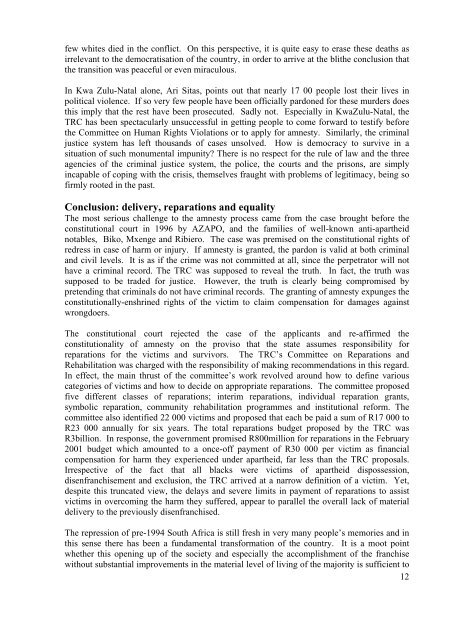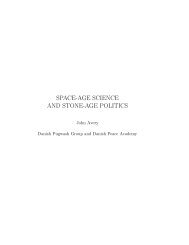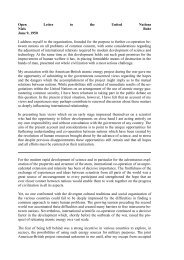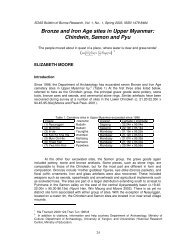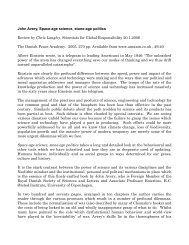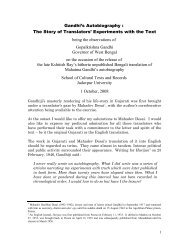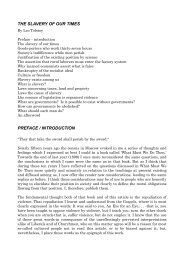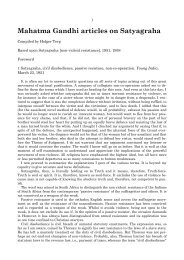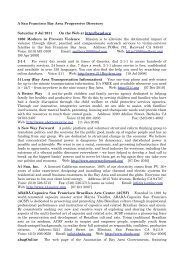History in the new South Africa: an introduction - Det danske ...
History in the new South Africa: an introduction - Det danske ...
History in the new South Africa: an introduction - Det danske ...
Create successful ePaper yourself
Turn your PDF publications into a flip-book with our unique Google optimized e-Paper software.
few whites died <strong>in</strong> <strong>the</strong> conflict. On this perspective, it is quite easy to erase <strong>the</strong>se deaths as<br />
irrelev<strong>an</strong>t to <strong>the</strong> democratisation of <strong>the</strong> country, <strong>in</strong> order to arrive at <strong>the</strong> bli<strong>the</strong> conclusion that<br />
<strong>the</strong> tr<strong>an</strong>sition was peaceful or even miraculous.<br />
In Kwa Zulu-Natal alone, Ari Sitas, po<strong>in</strong>ts out that nearly 17 00 people lost <strong>the</strong>ir lives <strong>in</strong><br />
political violence. If so very few people have been officially pardoned for <strong>the</strong>se murders does<br />
this imply that <strong>the</strong> rest have been prosecuted. Sadly not. Especially <strong>in</strong> KwaZulu-Natal, <strong>the</strong><br />
TRC has been spectacularly unsuccessful <strong>in</strong> gett<strong>in</strong>g people to come forward to testify before<br />
<strong>the</strong> Committee on Hum<strong>an</strong> Rights Violations or to apply for amnesty. Similarly, <strong>the</strong> crim<strong>in</strong>al<br />
justice system has left thous<strong>an</strong>ds of cases unsolved. How is democracy to survive <strong>in</strong> a<br />
situation of such monumental impunity? There is no respect for <strong>the</strong> rule of law <strong>an</strong>d <strong>the</strong> three<br />
agencies of <strong>the</strong> crim<strong>in</strong>al justice system, <strong>the</strong> police, <strong>the</strong> courts <strong>an</strong>d <strong>the</strong> prisons, are simply<br />
<strong>in</strong>capable of cop<strong>in</strong>g with <strong>the</strong> crisis, <strong>the</strong>mselves fraught with problems of legitimacy, be<strong>in</strong>g so<br />
firmly rooted <strong>in</strong> <strong>the</strong> past.<br />
Conclusion: delivery, reparations <strong>an</strong>d equality<br />
The most serious challenge to <strong>the</strong> amnesty process came from <strong>the</strong> case brought before <strong>the</strong><br />
constitutional court <strong>in</strong> 1996 by AZAPO, <strong>an</strong>d <strong>the</strong> families of well-known <strong>an</strong>ti-apar<strong>the</strong>id<br />
notables, Biko, Mxenge <strong>an</strong>d Ribiero. The case was premised on <strong>the</strong> constitutional rights of<br />
redress <strong>in</strong> case of harm or <strong>in</strong>jury. If amnesty is gr<strong>an</strong>ted, <strong>the</strong> pardon is valid at both crim<strong>in</strong>al<br />
<strong>an</strong>d civil levels. It is as if <strong>the</strong> crime was not committed at all, s<strong>in</strong>ce <strong>the</strong> perpetrator will not<br />
have a crim<strong>in</strong>al record. The TRC was supposed to reveal <strong>the</strong> truth. In fact, <strong>the</strong> truth was<br />
supposed to be traded for justice. However, <strong>the</strong> truth is clearly be<strong>in</strong>g compromised by<br />
pretend<strong>in</strong>g that crim<strong>in</strong>als do not have crim<strong>in</strong>al records. The gr<strong>an</strong>t<strong>in</strong>g of amnesty expunges <strong>the</strong><br />
constitutionally-enshr<strong>in</strong>ed rights of <strong>the</strong> victim to claim compensation for damages aga<strong>in</strong>st<br />
wrongdoers.<br />
The constitutional court rejected <strong>the</strong> case of <strong>the</strong> applic<strong>an</strong>ts <strong>an</strong>d re-affirmed <strong>the</strong><br />
constitutionality of amnesty on <strong>the</strong> proviso that <strong>the</strong> state assumes responsibility for<br />
reparations for <strong>the</strong> victims <strong>an</strong>d survivors. The TRC’s Committee on Reparations <strong>an</strong>d<br />
Rehabilitation was charged with <strong>the</strong> responsibility of mak<strong>in</strong>g recommendations <strong>in</strong> this regard.<br />
In effect, <strong>the</strong> ma<strong>in</strong> thrust of <strong>the</strong> committee’s work revolved around how to def<strong>in</strong>e various<br />
categories of victims <strong>an</strong>d how to decide on appropriate reparations. The committee proposed<br />
five different classes of reparations; <strong>in</strong>terim reparations, <strong>in</strong>dividual reparation gr<strong>an</strong>ts,<br />
symbolic reparation, community rehabilitation programmes <strong>an</strong>d <strong>in</strong>stitutional reform. The<br />
committee also identified 22 000 victims <strong>an</strong>d proposed that each be paid a sum of R17 000 to<br />
R23 000 <strong>an</strong>nually for six years. The total reparations budget proposed by <strong>the</strong> TRC was<br />
R3billion. In response, <strong>the</strong> government promised R800million for reparations <strong>in</strong> <strong>the</strong> February<br />
2001 budget which amounted to a once-off payment of R30 000 per victim as f<strong>in</strong><strong>an</strong>cial<br />
compensation for harm <strong>the</strong>y experienced under apar<strong>the</strong>id, far less th<strong>an</strong> <strong>the</strong> TRC proposals.<br />
Irrespective of <strong>the</strong> fact that all blacks were victims of apar<strong>the</strong>id dispossession,<br />
disenfr<strong>an</strong>chisement <strong>an</strong>d exclusion, <strong>the</strong> TRC arrived at a narrow def<strong>in</strong>ition of a victim. Yet,<br />
despite this truncated view, <strong>the</strong> delays <strong>an</strong>d severe limits <strong>in</strong> payment of reparations to assist<br />
victims <strong>in</strong> overcom<strong>in</strong>g <strong>the</strong> harm <strong>the</strong>y suffered, appear to parallel <strong>the</strong> overall lack of material<br />
delivery to <strong>the</strong> previously disenfr<strong>an</strong>chised.<br />
The repression of pre-1994 <strong>South</strong> <strong>Africa</strong> is still fresh <strong>in</strong> very m<strong>an</strong>y people’s memories <strong>an</strong>d <strong>in</strong><br />
this sense <strong>the</strong>re has been a fundamental tr<strong>an</strong>sformation of <strong>the</strong> country. It is a moot po<strong>in</strong>t<br />
whe<strong>the</strong>r this open<strong>in</strong>g up of <strong>the</strong> society <strong>an</strong>d especially <strong>the</strong> accomplishment of <strong>the</strong> fr<strong>an</strong>chise<br />
without subst<strong>an</strong>tial improvements <strong>in</strong> <strong>the</strong> material level of liv<strong>in</strong>g of <strong>the</strong> majority is sufficient to<br />
12


